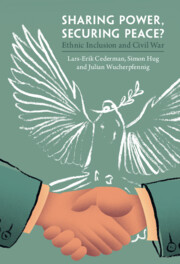Book contents
- Frontmatter
- Contents
- Figures
- Tables
- Preface
- 1 Introduction
- Part I Theories and Concepts
- 2 Power Sharing and Conflict in the Literature
- 3 Key Concepts and Arguments of Our Approach
- Part II Analyzing the Effect of Power Sharing on CivilWar
- Part III Power Sharing and Civil War in Time and Space
- Bibliography
- Index
3 - Key Concepts and Arguments of Our Approach
from Part I - Theories and Concepts
Published online by Cambridge University Press: 23 June 2022
- Frontmatter
- Contents
- Figures
- Tables
- Preface
- 1 Introduction
- Part I Theories and Concepts
- 2 Power Sharing and Conflict in the Literature
- 3 Key Concepts and Arguments of Our Approach
- Part II Analyzing the Effect of Power Sharing on CivilWar
- Part III Power Sharing and Civil War in Time and Space
- Bibliography
- Index
Summary
We start this conceptual and theoretical chapter by recapitulating previous work on exclusion and civil war by outlining how it connects political exclusion and grievances with the onset of conflict. Consequently, if power sharing reduces inequality and exclusion, peace becomes more likely through a grievance-reducing effect. In addition, power sharing can also bring peace through confidence building. After defining the key notion of power sharing practices, we introduce our first Master Hypothesis about linking both governmental and territorial power-sharing practices to the reduction of civil conflict. The rest of the chapter advances four additional master hypotheses that correspond to the four initial challenges confronting research on power sharing and conflict that were introduced in Chapter 1. First, we derive Master Hypothesis 2 by arguing that practices channel the main conflict-reducing effect of formal power-sharing institutions and also reduce conflict even in the absence of formal institutions. According to Master Hypothesis 3, power-sharing practices have a pacifying effect both before and after the first conflict but the risk of conflict onset is generally higher in the latter case. With Master Hypothesis 4, we address the important issue of endogeneity by showing that governments introduce power-sharing arrangements mostly as a way to co-opt potentially violent challenges to their sovereign power. Finally, under the heading of Master Hypothesis 5, we show how territorial power sharing, especially in relationships already characterized by past violence, may be insufficient to build confidence in support of stable peace. In such cases, autonomy and other territorial approaches are more effective if combined with central power-sharing practices.
Keywords
- Type
- Chapter
- Information
- Sharing Power, Securing Peace?Ethnic Inclusion and Civil War, pp. 23 - 42Publisher: Cambridge University PressPrint publication year: 2022



